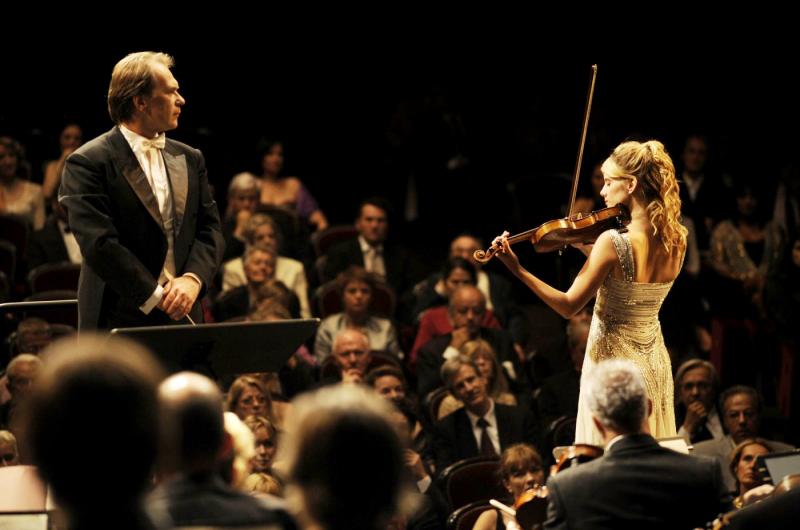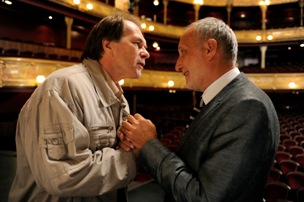The Concert | reviews, news & interviews
The Concert
The Concert
Charming but uneven: a fake Bolshoi orchestra plays in Paris

Give any masterpiece of classical music a central role in a film - and everything else straightaway faces the highest standards of comparison. In Radu Mihaileanu’s The Concert, it's the Tchaikovsky violin concerto, and from the opening frames the music delivers everything it should – though whether it’s enough to hide other noises (clunking in the script department being only one of them) is another matter.
First-half depictions of contemporary Russia work more assuredly on the comedy front, even if this concert’s brand of humour quickly slips considerably south of Moscow to lodge somewhere in the Balkans. Franco-Romanian director Mihaileanu pulls out every stop often associated with fare from that region, then some more, before bringing down the curtain on an emotional high note that may persuade even the hardest-hearted sceptics. Just.
Of all the secrets in the corridors of Russia’s Bolshoi Theatre a decade or more after perestroika swept away the cobwebs of ideological control, a dissident conductor genius, demoted to janitor in the early 1980s for defending his Jewish musicians, must be among the more recherché ones to be found lurking in any scriptwriter’s imagination. But that’s where we first encounter Andrei Filipov (played by Russian actor Alexei Guskov, pictured below on the left), so we know straight away we are watching a fantasy land, that convenient location where details of things like, well, Communism can be rolled out to order to drive a story along.
 At least we know the capital is still Moscow, as proved by the presence of Red Square and the said theatre’s famous four horsemen. (Scenes shot there at least have that slightly bleached authentic quality that highlights the city’s essential lack of rich summer street colour; dating needs further attention, though, given that Moscow traffic hasn’t looked as benign as it does here any time this century).
At least we know the capital is still Moscow, as proved by the presence of Red Square and the said theatre’s famous four horsemen. (Scenes shot there at least have that slightly bleached authentic quality that highlights the city’s essential lack of rich summer street colour; dating needs further attention, though, given that Moscow traffic hasn’t looked as benign as it does here any time this century).
So, Andrei has a history. He also has friends, namely his past orchestra members, now dispersed into all sorts of just-getting-by jobs, which range from driving an ambulance to dubbing porn movies – all that’s well sketched, and true to life in human details. Out of the blue they receive an opportunity – to reassert their own dignity (and, by extension, that oldest chestnut human potential, too). They have a few problems along the way: some their own foibles (endearing enough), but principally organisational - but nothing that can’t be solved by importing the rules from somewhere else, namely the place where Balkan films of a certain character are made (and where Yiddish or Romany is as likely a common language as any). In short they’re not just a gaggle of aging musicians determined to pass themselves off as the real Bolshoi orchestra, but, in the words of the film’s US distributor (the Weinstein Company, no less) a band of misfits – two words that seem to attract the attention of a stateside publicist like a red rag to a bull.
But they’ve chosen Paris as the location for their deed – another problem given that France is not conventionally a place where the rules of Balkan films of a certain character are usually observed (except, of course, when they are). And their collaborators are no less than international violinist Anne-Marie Jacquet (Mélanie Laurent), and her agent-cum-mother-figure Guylene (Miou-Miou), as well as the starched shirts of the city’s Chatelet theatre. But help is at hand, with a deus ex machina plot revelation – and, to the credit of director Mihaileanu, not the one we’re initially set up to expect - which comes just in time, and just when our visiting musicians have finished playing out the supplementary roles demanded of them by a whole host of little subplots (featuring a whole host of racial stereotypes that some may feel rather sour the atmosphere of this fast-moving feast).
In short, if sentimental instincts win out over cynical ones, The Concert should please, even if audiences leave wondering if it's a Russian film (few contemporary Russian directors could come up with anything this accomplished and audience-pleasing, though). There's much to like. Guskov is an actor always sparing in his facial expressions. His character pairs as well here with his new French screen partners, as with his oldest friend, cellist Sasha (Dmitry Nazarov), and oldest enemy, the unrepentant Communist apparatchik Gavrilov, very appealingly played by Valery Barinov - the most recent in a line of elderly Soviet strong men asserting the dignity of the way things used to be. I could have sworn I saw Franco-Serbian director Emir Kusturica in an uncredited cameo, but even if that was a trick of a beard, his spirit presides at least over the first part of The Concert - and that's a high compliment to Mihaileanu.
And, of course, there's the music. I caught a credit to the Budapest Symphony Orchestra, presumably chosen for reasons of economic rather than spiritual closeness to the film's mythical heartland. But nothing that appeared to note who was actually playing the solo violin part.
Watch The Concert trailer
Add comment
The future of Arts Journalism
You can stop theartsdesk.com closing!
We urgently need financing to survive. Our fundraising drive has thus far raised £49,000 but we need to reach £100,000 or we will be forced to close. Please contribute here: https://gofund.me/c3f6033d
And if you can forward this information to anyone who might assist, we’d be grateful.

Subscribe to theartsdesk.com
Thank you for continuing to read our work on theartsdesk.com. For unlimited access to every article in its entirety, including our archive of more than 15,000 pieces, we're asking for £5 per month or £40 per year. We feel it's a very good deal, and hope you do too.
To take a subscription now simply click here.
And if you're looking for that extra gift for a friend or family member, why not treat them to a theartsdesk.com gift subscription?
more Film
 Blu-ray: The Graduate
Post #MeToo, can Mike Nichols' second feature still lay claim to Classic Film status?
Blu-ray: The Graduate
Post #MeToo, can Mike Nichols' second feature still lay claim to Classic Film status?
 Little Trouble Girls review - masterful debut breathes new life into a girl's sexual awakening
Urska Dukic's study of a confused Catholic teenager is exquisitely realised
Little Trouble Girls review - masterful debut breathes new life into a girl's sexual awakening
Urska Dukic's study of a confused Catholic teenager is exquisitely realised
 Young Mothers review - the Dardennes explore teenage motherhood in compelling drama
Life after birth: five young mothers in Liège struggle to provide for their babies
Young Mothers review - the Dardennes explore teenage motherhood in compelling drama
Life after birth: five young mothers in Liège struggle to provide for their babies
 Blu-ray: Finis Terrae
Bleak but compelling semi-documentary, filmed on location in Brittany
Blu-ray: Finis Terrae
Bleak but compelling semi-documentary, filmed on location in Brittany
 Oslo Stories Trilogy: Sex review - sexual identity slips, hurts and heals
A quietly visionary series concludes with two chimney sweeps' awkward sexual liberation
Oslo Stories Trilogy: Sex review - sexual identity slips, hurts and heals
A quietly visionary series concludes with two chimney sweeps' awkward sexual liberation
 Sorry, Baby review - the healing power of friendship in the aftermath of sexual assault
Eva Victor writes, directs and stars in their endearing debut feature
Sorry, Baby review - the healing power of friendship in the aftermath of sexual assault
Eva Victor writes, directs and stars in their endearing debut feature
 Blu-ray: Who Wants to Kill Jessie?
Fast-paced and visually inventive Czech comedy
Blu-ray: Who Wants to Kill Jessie?
Fast-paced and visually inventive Czech comedy
 Oslo Stories Trilogy: Love review - freed love
Gay cruising offers straight female lessons in a heady ode to urban connection
Oslo Stories Trilogy: Love review - freed love
Gay cruising offers straight female lessons in a heady ode to urban connection
 Beating Hearts review - kiss kiss, slam slam
Romance and clobberings in a so-so French melodrama
Beating Hearts review - kiss kiss, slam slam
Romance and clobberings in a so-so French melodrama
 Materialists review - a misfiring romcom or an undercooked satire?
Writer-director Celine Song's latest can't decide what kind of film it is
Materialists review - a misfiring romcom or an undercooked satire?
Writer-director Celine Song's latest can't decide what kind of film it is
 theartsdesk Q&A: actor Leonie Benesch on playing an overburdened nurse in the Swiss drama 'Late Shift'
The Guildhall-trained German star talks about the enormous pressures placed on nurses and her admiration for British films and TV
theartsdesk Q&A: actor Leonie Benesch on playing an overburdened nurse in the Swiss drama 'Late Shift'
The Guildhall-trained German star talks about the enormous pressures placed on nurses and her admiration for British films and TV

Comments
...
Are you sure that Sarah